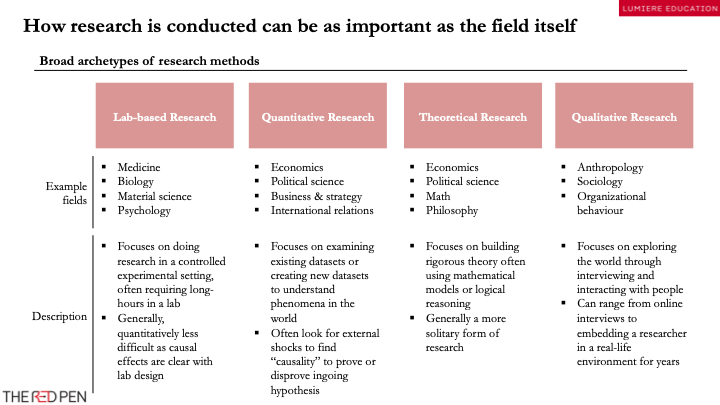One of the most common questions I receive as a part of the Lumiere Research Scholar Program is, “I am interested in XXX subject (for example, economics, international relations, literature). Can I do research in it?”
The question comes from decades of messaging around research as a primarily lab-based practice. Research frequently conjures images of scientists in the lab with white coats using a pipette. Though lab-based research is a significant part of many types of research, it’s not the only type of research–and not the easiest for students to experience from their home. Research covers much more than lab-based STEM fields.
When thinking about research, it’s helpful to understand that there are two axes for types of research: field and methodology.
The field of research is what many of us think about when we consider types of research. For example, chemistry is one field, whereas economics is another. However, even within a broad subject, such as economics, there may be multiple sub-fields. Economics includes labour economics, behavioural economics and industrial organisation, among many others.
The other axis of difference, which we’ve found fewer students think about is the methodology or approach to doing the research. Within one field, for example, there can be multiple approaches to doing research.
Below, we visualise the four main types of research methods.

In the visualisation, you’ll notice that one field could span multiple research methods. Economics, for example, has some research projects that are quantitative. This means that researchers use datasets, often large ones, to approach a specific question about the world. Similarly, many economists use a more theoretical approach to research. This involves developing mathematical equations to represent a phenomenon in the world.
In particular, the four main archetypes of research are:
1) Lab-based research:
This type of research is conducted in a controlled lab environment. It is characterised by researchers changing one or multiple independent variables and then measuring the impact on a dependent variable.
2) Quantitative research:
This type of research is conducted primarily using existing datasets or collecting new datasets. The goal of this type of research is to find patterns in the data, often by leveraging an external effect or quasi-experiment.
3) Theoretical research:
This type of research focuses on using rigorous logic to develop new theories or conclusions about the world. Some types of research are primarily theoretically based, like pure mathematics, while others alternate between theoretical research and other types of data-based approaches.
4) Qualitative research:
This type of research uses interviews and observation to understand a scientific question. For example, anthropologists often spend extended periods of time in an environment they are interested in studying. During that time, they take notes on their observations and synthesise them into findings. Another example of qualitative research could be interviewing subjects on a research question of interest.
When thinking about the type of research you want to do, consider not only the subjects you are interested in but also how you like to address questions. Do you like to talk with people? Then you might enjoy qualitative research. Do you find the idea of doing data science attractive? Then look towards quantitative research.
For example, when I began my PhD at Harvard Business School, I thought about my time studying statistics as an undergraduate student. I loved the feeling of precision when using large datasets. So when I thought about approaching research questions about business, I knew that I wanted quantitative methods to be my primary methodology. That hasn’t stopped me from other methods, but it has given me a set of tools that I constantly work to improve.
As a high school or college student, you don’t need to know what is your favourite methodology or subject from the beginning. In fact, the best way to see what you enjoy is to test it out–either by working with a faculty member or doing research in a programme like the Lumiere Research Scholar Program. When I was an undergraduate student, I assisted with a number of qualitative research projects before I decided to focus on the quantitative. I encourage you to do the same.
So, when you’re thinking about doing research, don’t stop at thinking about the subject in which you’re interested. Instead, consider what methodologies you enjoy and how you like to spend your time. This is the first step in beginning your research journey!
Stephen Turban is a guest blogger with The Red Pen. He is also the founder of the Lumiere Research Scholar Program, which helps talented high school and college students work directly with researchers from elite universities.




